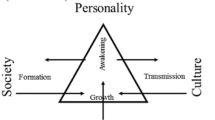Abstract
Recently, feminists like Jane Roland-Martin, Elizabeth Young-Bruehl, and others have advocated a conversational metaphor for thinking and rationality, and our image of the rational person. Elizabeth Young-Bruehl refers to thinking as a “constant interconnecting of representations of experiences and an extension of how we hear ourselves and others. There are numerous disadvantages to thinking about thinking as a conversation.
We think there are difficulties in accepting the current formulation of the conversational metaphor without question. First, there is danger that we will lose important dialectical connections like that between the self and society. Second, the conversational metaphor alone cannot fully express the way conversations are constructed. We will want to take up the notion of narrative as a metaphor for thinking advocated by Susan Bordo, Alasdair MacIntyre, Jerome Bruner, and others, including Mary Belenky and her colleagues.
Eventually, we want to champion narrative and the dramatic narrative of culture as a metaphor for thinking that involves such expressions as sights, insights, silences, as well as sounds, moments of mood and poetic moments. The dramatic narrative provides the structural possibilities needed to criticize certain kinds of conversations, in order to talk about the relations of public and private, self and society and most importantly, about the drama of our lives within and without.
The dramatic narrative for thinking helps dispel the dangerous dualisms of mind and body that not even conversation or narration alone can banish, and allows us to frame questions about education that do not require us to separate mind from body. The dramatic narrative metaphor for thinking lets us show who we are, act out what we think, and reconstruct rationality to reflect what many women, and some men, do.
Similar content being viewed by others
Bibliography
Belenky, Mary, Blythe Clinchy, Nancy Goldberger, and Jill Tarule: 1986, Women's Ways of Knowing, Basic Books, New York.
Bordo, Susan: 1986, ‘The Cartesian Masculinization of Thought,’ Signs 11(2), 441–456.
Bruner, Jerome: 1986, Actual Minds, Possible Worlds, Harvard University Press, Cambridge, Mass.
Dewey, John: 1934, Art as Experience, Putnam, New York.
Fee, Elizabeth: 1986, Critiques of Modern Science: The Relationship of Feminism to Other Radical Epistemologies, in Feminist Approaches to Science, Pergamon Press, New York.
Gilligan, Carol: 1982, In a Different Voice, Harvard University Press, Cambridge, Mass.
Greene, Maxine: 1985, ‘Imagination and Learning: A Reply to Kieran Egan, Teachers College Record 87 (2), 170–186.
Hintikka, Jaakko: 1978, ‘A Discourse on Descartes Method,’ in M. Hooker (ed.), Descartes: Critical and Interpretive Essays, Johns Hopkins University Press, Baltimore.
Hirst, P.H.: 1972, Liberal education and the nature of knowledge, in Education and reason, part 3, R.F. Dearden, P.H. Hirst and R.S. Peters (eds.), Routledge & Kegan Paul, London.
Langer, Suzanne: 1988, Mind: An Essay on Human Feeling, Johns Hopkins University Press, London.
MacIntyre, Alasdair: 1980, ‘Epistemological Crisis, Dramatic Narrative, and the Philosophy of Science,’ in Paradigms and Revolutions, Gary Gutting, (ed.), University of Notre Dame Press, London.
Martin, Jane Roland: 1986, ‘Redefining the Educated Person: Rethinking the Significance of Gender,’ Educational Researcher 15, 6–10.
Martin, Jane Roland: 1985, Reclaiming a Conversation, Yale University Press, New York.
Oakeshott, Michael: 1962, Rationalism in Politics, Basic Books, New York.
Young-Bruehl, Elisabeth: 1987, ‘The Education of Women as Philosophers,’ Signs 12(2), 207–221.
Author information
Authors and Affiliations
Rights and permissions
About this article
Cite this article
Pappas, E.C., Garrison, J.W. Towards a new philosophy of education: Extending the conversational metaphor for thinking. Studies in Philosophy and Education 10, 297–314 (1991). https://doi.org/10.1007/BF00364546
Issue Date:
DOI: https://doi.org/10.1007/BF00364546




